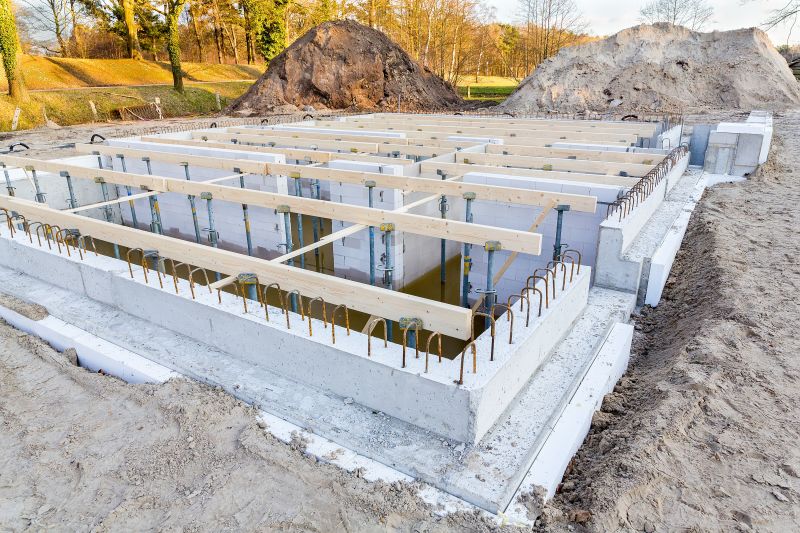Popular Helical Pile Installation Products For Construction Professionals
Discover essential equipment and accessories trusted by industry experts to ensure secure and efficient pile installations.
 Products for helical pile installations encompass a diverse array of tools, accessories, and components designed to facilitate the secure and efficient anchoring of structures into the ground. Helical piles, also known as screw piles, are deep foundation solutions that utilize helical flightings attached to a central shaft, which are rotated into the soil to provide stability. The variety of products available ensures that professionals and DIY enthusiasts can select appropriate equipment tailored to specific project requirements. These products include different types of helical pile segments, driving tools, adapters, and accessories that enhance installation precision and ease.
Products for helical pile installations encompass a diverse array of tools, accessories, and components designed to facilitate the secure and efficient anchoring of structures into the ground. Helical piles, also known as screw piles, are deep foundation solutions that utilize helical flightings attached to a central shaft, which are rotated into the soil to provide stability. The variety of products available ensures that professionals and DIY enthusiasts can select appropriate equipment tailored to specific project requirements. These products include different types of helical pile segments, driving tools, adapters, and accessories that enhance installation precision and ease.
Top Overall Option
Universal Helical Pile Driving System
This versatile driving system offers adjustable torque capabilities and compatibility with multiple shaft sizes, making it suitable for various installation scenarios. Its ergonomic design ensures ease of use and efficient operation, supporting both professional contractors and serious DIYers. The system includes a hydraulic drive head, extension shafts, and adapters, providing a comprehensive solution for helical pile installation projects.
Types of Products For Helical Piles Installations
Helical Shaft Segments
Various sizes and configurations of helical shaft segments designed for different load requirements and soil conditions.
Hydraulic Drive Heads
Powerful hydraulic units used to rotate and install helical piles efficiently and with controlled torque.
Extension Shafts
Additional shafts that extend the reach of the pile, suitable for deep installations.
Couplings and Adapters
Connectors that link different shaft segments or attach driving equipment to piles securely.
Corrosion Protection Coatings
Protective coatings to enhance durability and resistance to environmental factors.
Installation Adapters
Specialized adapters to facilitate installation in challenging soil conditions or tight spaces.
Torque Wrenches
Tools used to measure and control torque during installation for consistency and safety.
Pile Caps and Bases
Components that distribute load from the structure to the pile and provide connection points.
Soil Sampling Tools
Instruments for assessing soil conditions prior to installation.
Vibration and Pre-drilling Equipment
Tools that assist in preparing the ground for pile installation, especially in dense or rocky soils.
Popular Choices
Devices that enhance torque transfer during pile driving, suitable for various soil types.
Additional shafts for reaching greater depths with ease and stability.
Protective layers that extend the lifespan of installed piles in harsh environments.
Robust equipment designed to handle demanding installation projects efficiently.
Flexible drive heads that accommodate different pile sizes and soil conditions.
Complete kits for extending pile length without compromising stability.
Ease of assembly and disassembly during installation or maintenance.
Tools and materials used to improve ground conditions prior to installation.
Compact units that provide reliable power for remote or small-scale projects.
Accessories to reduce vibration impact during pile driving, enhancing safety and precision.
The process of installing helical piles demands specialized equipment capable of applying controlled torque to rotate the piles into the ground. This often involves hydraulic or mechanical drive heads, which are compatible with various shaft sizes and configurations. Additionally, accessories such as extension shafts, couplings, and corrosion protection coatings are essential for adapting to different soil conditions and load requirements. Proper selection of these components can contribute to the longevity and stability of the installed foundation.
When choosing products for helical pile installation, considerations such as soil type, load capacity, installation depth, and environmental factors are crucial. The right tools and accessories can help achieve optimal installation angles, minimize site disturbance, and ensure that the piles meet structural specifications. Compatibility between different product components and adherence to safety standards are also important aspects to evaluate before making a purchase. Overall, the array of products available supports a range of applications from small residential projects to large commercial developments, providing versatility and reliability in foundation solutions.
Key Buying Considerations
- Soil type and ground conditions can influence the choice of pile size and driving equipment.
- Load capacity requirements should align with the structural demands of the project.
- Installation depth and reach capabilities are critical for ensuring proper foundation support.
- Compatibility between shaft segments, drive heads, and accessories is essential for seamless operation.
- Durability and corrosion resistance are important for long-term performance, especially in challenging environments.
- Ease of assembly and disassembly can impact installation efficiency and maintenance.
- Power source compatibility, such as hydraulic or electric, should match available site infrastructure.
- Safety features and ergonomic design contribute to safer operation and reduced fatigue.
- Budget constraints may influence the selection of equipment and accessories without compromising quality.
- Availability of replacement parts and customer support can affect long-term usability.
- Environmental conditions like moisture, soil acidity, or presence of underground utilities should be considered.
- Project scale and volume may determine whether to invest in professional-grade equipment or smaller tools.
- Regulatory compliance and safety standards should be verified for all equipment and accessories.
- Transportability and portability of equipment are important for remote or confined site installations.
- User reviews and expert recommendations can provide additional insights into product performance.
